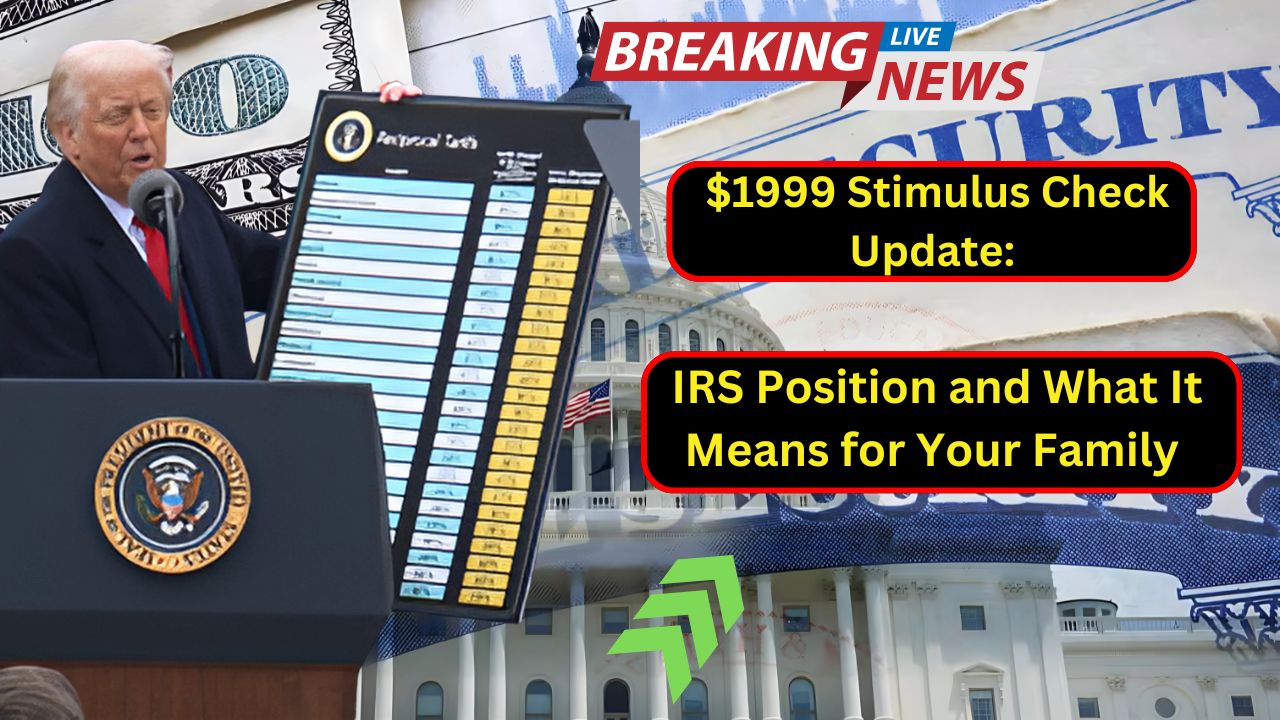Americans across the country are buzzing about a potential $1999 Economic Relief Package for 2025, but before you start planning how to spend this money, it’s crucial to understand the real situation. While social media and various websites are spreading information about this payment, the truth is more complicated than many realize.
The rumors surrounding a $1999 economic stimulus payment have created both hope and confusion among families struggling with rising costs of living. However, as of now, the Internal Revenue Service (IRS) has not officially announced or confirmed any such payment for 2025.
Understanding Economic Relief Payments and Their Purpose
What Are Stimulus Payments?
Economic relief payments, commonly known as stimulus checks, serve as financial lifelines during national emergencies. These payments target individuals and families facing economic hardship due to circumstances beyond their control, such as:
- Natural disasters
- Economic recessions
- Pandemics
- Widespread unemployment
The primary goal is simple: put money directly into people’s pockets when they need it most. This approach helps families cover essential expenses like groceries, rent, utilities, and healthcare while stimulating economic activity throughout the country.
Historical Context of Stimulus Payments
To understand the current situation better, let’s look at when Americans have received stimulus payments in the past:
| Payment Period | Reason | Amount for Adults | Amount for Children |
|---|---|---|---|
| 2008 | Financial Crisis | Up to $600 (single), $1,200 (couples) | $300 per child |
| April 2020 | COVID-19 Pandemic | $1,200 | $500 |
| December 2020 | COVID-19 Continued Impact | $600 | $600 |
Each of these payments was officially announced by government agencies and distributed through established channels, primarily direct deposit and mailed checks.
The Current $1999 Payment Claims: What We Know
Where the Rumors Started
The speculation about a $1999 economic relief package appears to stem from various unofficial sources and social media posts. These claims suggest that this payment would be the “fourth stimulus payment” following the three previous distributions during the 2008 financial crisis and COVID-19 pandemic.
However, it’s important to note that no official government source has announced or confirmed such a payment. The IRS website, which serves as the authoritative source for stimulus payment information, contains no information about a 2025 economic relief package.
Why People Are Hopeful
The interest in another stimulus payment isn’t surprising. Many Americans continue to face financial challenges due to:
- Persistent inflation affecting grocery prices, housing costs, and everyday expenses
- Economic uncertainty in various industries
- Rising healthcare costs impacting family budgets
- Student loan payments resuming after pandemic pauses
These ongoing financial pressures make the idea of additional government assistance appealing to millions of families.
Who Would Potentially Qualify?
Expected Eligibility Criteria
If a $1999 economic relief package were to be announced, it would likely follow similar eligibility requirements as previous stimulus payments:
Income Requirements:
- Single filers with annual income below $75,000
- Joint filers with combined annual income below $150,000
- Heads of household meeting specific income thresholds
Other Potential Qualifications:
- U.S. citizenship or legal residency status
- Valid Social Security number
- Recent tax filing history
- Age requirements (typically 18 and older for full payments)
Priority Groups:
- Senior citizens and retirees
- Low to moderate-income families
- Recipients of Social Security benefits
- Veterans receiving benefits
Red Flags to Watch For
How to Identify Misinformation
Unfortunately, rumors about stimulus payments often attract scammers and spread misinformation. Here’s how to protect yourself:
Warning Signs of Fake Information:
- Claims requiring upfront payments or fees
- Requests for personal financial information via email or phone
- Promises of guaranteed payments without official government confirmation
- Websites asking for bank account details to “reserve” your payment
Reliable Information Sources:
- IRS.gov (official IRS website)
- Social Security Administration website
- Official government press releases
- Established news organizations with verification processes
What Should You Do Right Now?
Practical Steps for American Families
While waiting for official confirmation about any potential economic relief package, consider these practical approaches:
Financial Planning:
- Review your current budget and identify areas where you might reduce expenses
- Build an emergency fund, even if it’s just $5-10 per week
- Research local assistance programs that might help with utilities, food, or housing costs
Stay Informed Responsibly:
- Bookmark official government websites for accurate information
- Be skeptical of claims that seem too good to be true
- Verify information through multiple reliable sources before believing or sharing it
Protect Yourself from Scams:
- Never provide personal information to unknown callers claiming to represent government agencies
- Remember that legitimate government payments don’t require fees or advance payments
- Report suspicious contacts to appropriate authorities
The Bigger Picture of Economic Relief
Understanding Government Response to Economic Challenges
Economic relief packages don’t appear overnight. They typically require:
- Congressional approval and legislation
- Budget allocation discussions
- Implementation planning across multiple agencies
- Public announcement through official channels
The absence of any official discussion about a $1999 payment suggests that such a program is not currently in development at the federal level.
Moving Forward with Realistic Expectations
While the idea of receiving $1999 from the government is appealing, it’s important to base financial decisions on confirmed information rather than speculation. Instead of waiting for unconfirmed payments, focus on building financial stability through available resources and programs.
Many communities offer assistance programs for utilities, food, housing, and healthcare that can provide immediate relief. Additionally, tax credits like the Earned Income Tax Credit and Child Tax Credit provide substantial financial benefits to eligible families each year.
The key is staying informed through official sources while taking practical steps to improve your financial situation with the resources currently available.

